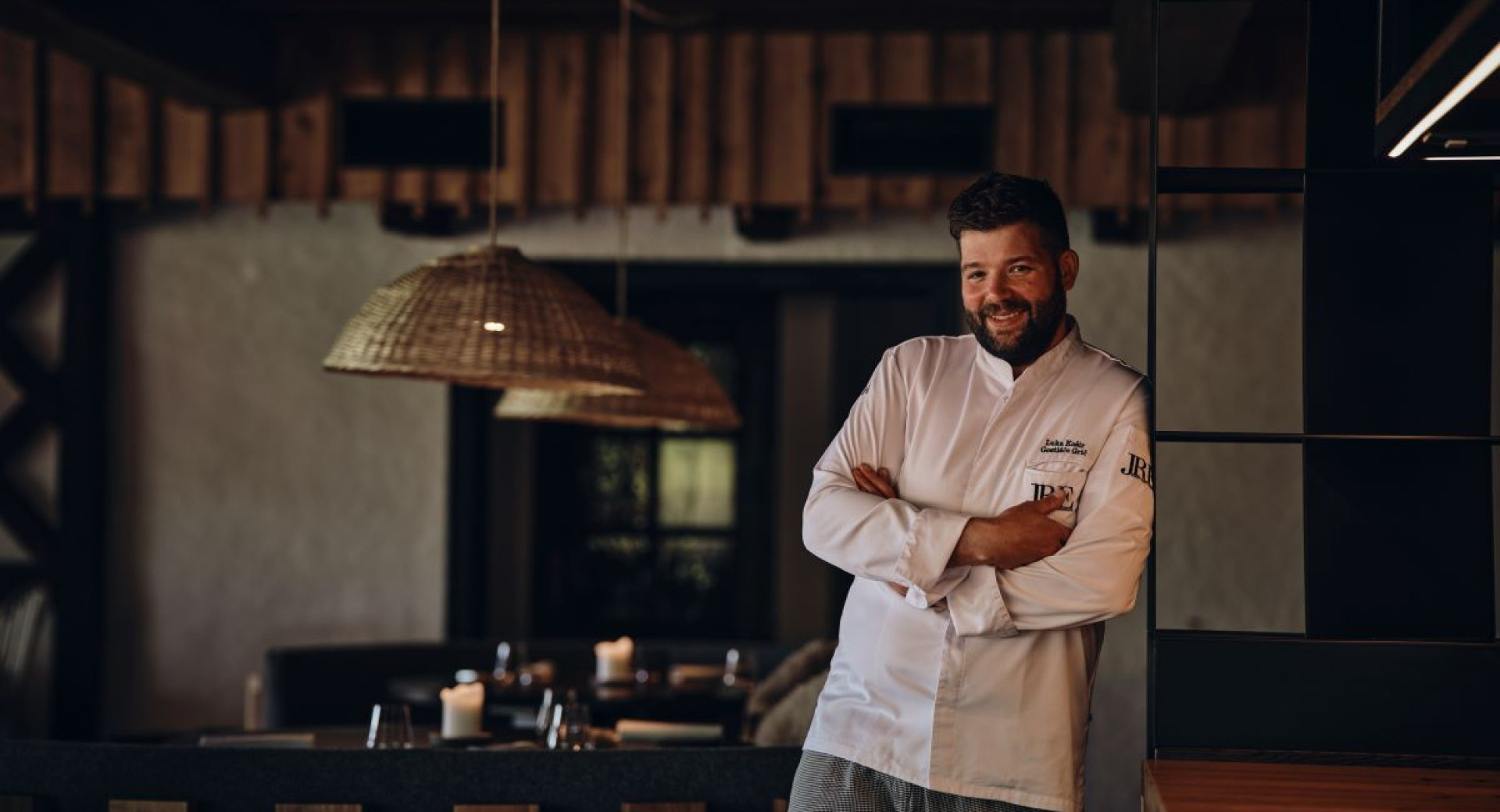LUKA KOŠIR (GRIČ)
We had a chat with Luka Košir, one of the most talented, creative and intriguing Slovenian chefs among the younger generation. Read on to find out what the head chef of Grič from Šentjošt nad Horjulom told us about the importance of projects such as the European Region of Gastronomy 2021 and the European Food Summit, about chef collaborations, the prospects of Slovenian cuisine, his plans for the future and many other interesting details.

© Suzana Gabrijan
Last year, Slovenia held the title European Region of Gastronomy 2021, with you yourself acting as the project’s ambassador. What is your view of this title and the related activities of the Slovenian professional culinary circles? What would you point out as the objectives that you’d like to achieve with the participating partners?
Yet, this is certainly one of the more relevant projects aiming to increase the visibility of Slovenian cuisine. Positive changes have been occurring in this area in recent years and I think we’ve become mature enough for projects of this type. To tell you the truth, I’m not quite sure what my role in all of this is exactly, but I feel I won’t have to bluff too much through it given my work philosophy. I think we should focus on highlighting the importance of tradition, the local approach and agricultural self-sufficiency with ingredients, as these are the factors that define the identity of a culinary region the most. Slovenians look over the border all too often, not realising how much potential there is right here, at home. Many realise it only later, after spending some time abroad. But identity is something that cannot be copied.
The European Food Summit (a European food symposium), in which you are actively involved, is fast approaching. How important do you find such events in terms of putting Slovenia on the global culinary map?
I’m proud to be able to take part in projects such as this one, as they help build Slovenian culinary awareness as well as our visibility. I believe such events are key to the recognisability of Slovenian cuisine worldwide. Much has been done in this regard by individuals such as Ana Roš, but the time has come for all others to also make an effort and steer our development in the right direction.
As part of this symposium you will take part at an experience dinner with Ana Roš (Hiša Franko) and Riccardo Camanini (Lido 84). What are you working on for the evening of cooking side by side with these two world-renowned chefs?
Heh, yes, I have to say that it’s a great honour for me to cook with such masters, so it’s quite difficult to decide on what the right dishes are. For that particular evening I’m planning dishes that are both local and seasonal at that time. I’ll start off with a trout, to which I’ll add black carrots and wood mushrooms. For the main course, I’ll serve root vegetables with beef tongue, a duck egg and duck garum. For dessert: parsnip with white chocolate, radicchio and hazelnuts.
In the past you’ve already been part of dinners involving two or more chefs. How much coordination is necessary to make such a dinner a real triumph? Do you usually talk a lot with the participating chefs? Do you polish your menus and look for some sort of a common thread, or is the magic of this type of events precisely in the fact that each chef tells their own story through their plates?
These events are really special because we always end up magically connected, while still able to leave our own individual mark on the evening. If chefs work a lot on local dishes, their dishes always contain something from their environment, something that others surely don’t have. So the dishes are rarely so alike that they would need adjusting.
Are you generally in favour of collaboration between chefs, or would you say you’re more of a “solitary chef”? Do you draw ideas mostly from your imagination and nature, or do you enjoy searching for new ideas with your colleagues from the culinary world?
Personally, I enjoy sharing knowledge and working with chefs who are prepared to collaborate constructively. There’s always something you can’t do or don’t know, and there’s always something that someone else can’t do or doesn’t know. At such a point, we can solve a lot of problems together. At the start of my culinary journey I was under the considerable influence of my role models, but I developed my own philosophy over the years. Now most of my inspiration comes from nature, the seasons and tradition. You have to hone and experience your evolution as a chef, it’s not something you can just pick up. This takes time, and there’s no way of avoiding mistakes, but they help you learn and grow.
The European Food Summit is putting together an extremely interesting agenda. Which event are you personally looking forward to most, and will make sure not to miss?
I’m most looking forward to lectures at the expert symposium at the Ljubljana Castle. Many of the speakers are people I greatly respect.
In recent years, Grič has been going through a metamorphosis, delighting Slovenian foodies time and time again with new ideas and approaches. What innovations are you planning for 2021 in Šentjošt?
Quite honestly, we have so many projects underway it’s hard for me to focus on just one. We’ll be working a lot on creating various spaces: from rooms used to mature meat and fish, to fermentation chambers and a testing kitchen. Then there’s of course all the work to be done on the fields and the duck farm. Hmmm, yes, the year will quickly turn out to be too short. (Laughter)
